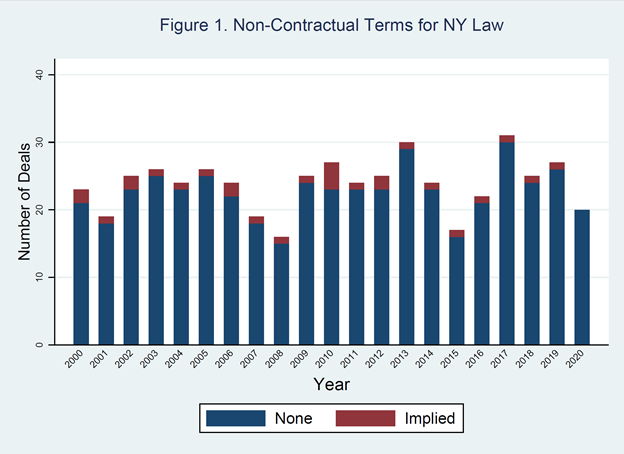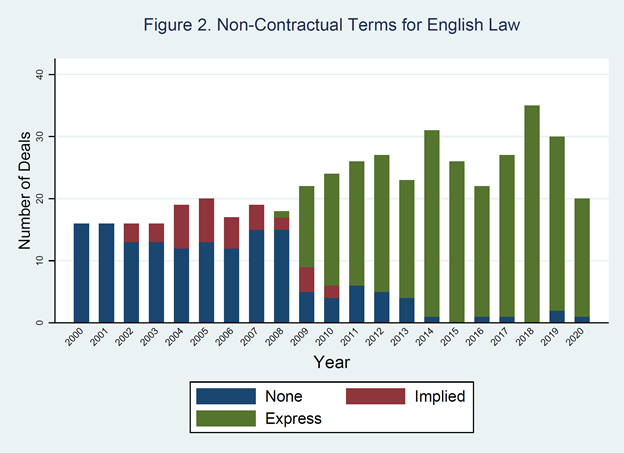Why Are (Some) New York Governing Law Provisions Longer and Less Intelligible Than English Provisions?
Posted:
Time to read:
Most students of contract law devote little or no time to the question of how contracts are produced. There is no need to be concerned with the actual production process if transactional lawyers always draft the precise contract terms that accurately reflect the parties’ contractual objectives. And conventional wisdom holds that good lawyers do study the relevant judicial opinions and thus know the precise words that will convey the contracting parties’ meaning to courts.
That’s the theory. And under that theory, if, say, New York and England have courts that use the same methods of interpretation of contract language (reading the plain common sense meaning of the words on paper), then contracts with the same objectives should have the same terms that serve to incorporate those objectives. And some lawyers would predict that is what we should see (for a discussion, see here).
But what if many transactional lawyers in the real world do not regularly read the latest cases or regulatory developments because their primary focus is on getting the deal done and not on what happens in the unlikely event the deal blows up. And what if that is especially the case when those legal developments concern an arcane topic such as conflict of laws. In that event, one might expect the drafting to fall behind current developments in the law (see here, here and here). And, other things equal, if conflict of laws is an equally arcane topic for transactional lawyers writing contracts under New York and English law, one would expect to see the problem of inattention to the latest developments in the law to be the same in both settings.
But other things are not necessarily the same. Law firms on different sides of the Atlantic operate quite differently (notwithstanding the presence of global law firms in the market). One significant difference reported to us is that a number of the big English firms have practice areas that function essentially as R&D departments: expert lawyers are tasked to follow developments in the law and assist other lawyers in updating documents (for a discussion, see here). By contrast, most US firms operate on a deal-by-deal basis—doing what is needed for the particular deal. Even in the case of the global firms, there are departments that follow developments in English law but not for NY (or US) law. (In our article, ‘Investigating the Contract Production Process’, we note some other significant differences between New York and English firms that point in the same direction).
To be sure, we are simplifying what are complex firm dynamics. But assuming that there are systematic differences in production practices between English and New York firms, and that New York and English courts have similar rules of contract interpretation, then (other things being equal) we should see differences in how standard contract provisions evolve in the two jurisdictions that are a function of the different production practices.
To test this prediction, we focus on a specific development in the law in 2009 (regulatory in the European context and case law in the US) that posed a risk that the basic governing law clause in sovereign debt issuances could be construed as not covering non-contractual issues. We collected data on the response rates in sovereign debt contracts to generalized calls by a set of experts on both sides of the Atlantic in 2009 to revise the governing law clauses for all contracts under both English law and New York law.
We tracked three versions of the governing clause: (1) governing law clauses that made no mention of non-contractual issues, (2) governing law clauses that specified that the clause will apply to non-contractual terms in substance without using the specific phrase ‘non-contractual’ (termed an ‘implied’ non-contractual term), (3) governing law clauses that specified that the clause will apply to non-contractual terms in substance and that explicitly used the phrase ‘non-contractual’ (termed an ‘express’ non-contractual term). We noted that the express non-contractual term started to appear shortly after the demand for practitioners to change the governing law clause in 2009. The figures below report on the governing law clause from 2000 to 2020 for sovereign bond issuances under New York law (Figure 1) and English law (Figure 2).


Note that in 2000, a governing law clause that did not deal with non-contractual issues was prevalent for both New York and English law contracts. Starting with the calls for change in 2009, English law contracts were revised at a much faster rate than their New York counterparts. Moreover, the particular type of governing law clause that became prevalent for English law contracts from 2009 onward was the express version (see Figure 2) while no New York law governing law clause included the express version (see Figure 1). This rapid and almost universal shift to a new form of the governing law clause for only English law contracts maps nicely on to what you would expect if you thought that the presence (or absence) of R&D departments, possibly coordinating across different law firms, made a difference.
Of course, one can’t jump to the foregoing conclusion quite so readily. The figure we report shows a stark difference, but we don’t claim this to be anything more than a reason to be excited about conducting further inquiries. Questions that must be asked of these preliminary results include the following:
- The article only looks at sovereign debt contracts. Perhaps governing law provisions in New York law sovereign debt contracts are much less important than those under English law and that is what explains the differences we see in the data?
- The legal developments that took place in England and New York that resulted in senior lawyers in 2009 urging their colleagues to revise their contract terms were different: it was a European regulatory development in England and a set of judicial opinions in the US. Maybe that made a big difference?
- What about other contract provisions? Particularly those that transactional lawyers actually care about rather than relatively arcane conflict of laws provisions? Maybe, if we looked at those other clauses, we’d see different patterns, with New York law provisions in some cases being revised faster?
Answering these questions requires additional research. But hopefully what we have found in the case of the governing law clauses provides a reason to investigate further.
Then there is the question we posed in our title. Governing law provisions under New York law tend to be longer and more complex in their phrasing than their counterparts under English law. What gives? As best we can tell, the provisions in the New York governing law contract clauses have many more useless words—some of which render the contract clauses less intelligible and could lead to costly litigation in the future. The English provisions on this one matter are shorter and more uniform.
In sum, preliminary evidence suggests that the contract production process matters. But more work needs to be done.
Stephen J. Choi is the Bernard Petrie Professor of Law and Business Director of the Pollack Center at New York University School of Law.
Robert E. Scott is the Alfred McCormack Professor Emeritus of Law at Columbia Law School.
Mitu Gulati is the John V. Ray Research Professor of Law at the University of Virginia.
OBLB categories:
OBLB types:
Share:
